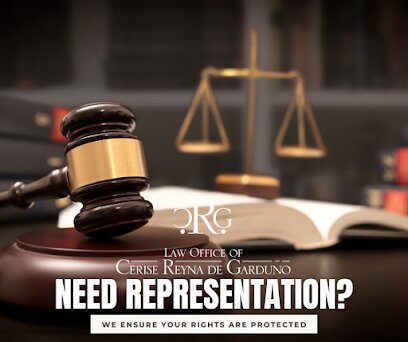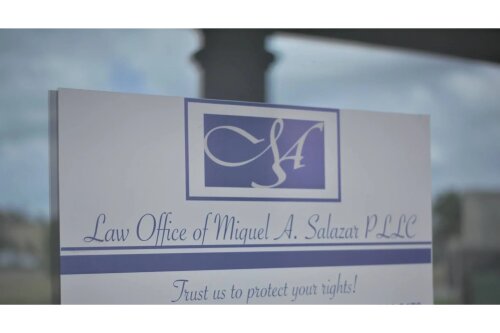Best Father's Rights Lawyers in Brownsville
Share your needs with us, get contacted by law firms.
Free. Takes 2 min.
Free Guide to Hiring a Family Lawyer
List of the best lawyers in Brownsville, United States
About Father's Rights Law in Brownsville, United States
Father's rights in Brownsville are governed largely by Texas family law and by local procedures in Cameron County courts that handle family matters. Whether you are a married father, an unmarried biological father, an adoptive father, or a stepfather seeking custody or visitation, the law generally balances parental rights with the child's best interests. Key concepts include establishing paternity, obtaining conservatorship (custody) and possession and access (visitation), complying with or modifying child support orders, and responding to or seeking enforcement of court orders.
Practically speaking, "father's rights" cover both the legal ability to make decisions for a child and the right to regular contact. They also carry responsibilities - most importantly, financial support. Fathers in Brownsville typically work within the Texas Family Code framework, local family courts, and state agencies when addressing these issues.
Why You May Need a Lawyer
A family law attorney can be essential when fatherhood issues become contested, complex, or urgent. Common situations where legal help is important include:
- Paternity disputes or the need to establish or challenge paternity.
- Contested conservatorship or possession and access disputes where the other parent objects to your requests for custody or visitation.
- Child support calculations, enforcement, arrearage resolution, or modification requests.
- Allegations of child abuse, neglect, or domestic violence that could limit or suspend parental rights.
- Petitions to terminate parental rights, and defending against termination.
- Relocation cases where a parent wants to move with the child outside the local area.
- Modifying existing orders after a substantial change in circumstances.
- Urgent needs such as emergency orders for protection, temporary custody, or emergency removal of a child.
- Navigating mediation, settlement negotiations, temporary orders, and trial preparation.
Local Laws Overview
Below are key legal features that affect fathers in Brownsville, framed around Texas law and local court practice:
- Paternity - For unmarried fathers, establishing paternity is the first step to securing rights. Paternity may be established by a signed Acknowledgement of Paternity, a court order after genetic testing, or as part of a court case. Once paternity is established, a father can seek conservatorship and possession.
- Conservatorship and Possession and Access - Texas uses the terms "conservatorship" for custody and "possession and access" for visitation. The court focuses on the child's best interests when deciding how to divide parental rights and set possession schedules. Texas often applies a standard possession order for noncustodial parents unless another arrangement better serves the child's needs.
- Child Support - Child support is calculated under state guidelines that consider both parents' incomes and the possession schedule. The Texas Attorney General's Child Support Division can assist with enforcement, but private enforcement through the court is also available.
- Modification and Enforcement - Orders for support, conservatorship, and possession can be modified for a material and substantial change in circumstances. Enforcement options include contempt proceedings, income withholding, liens, and involvement of state child support agencies.
- Termination and Adoption - Termination of parental rights is a serious and often irreversible step used in extreme cases such as abuse, abandonment, or when adoption is planned. A father's rights can be terminated by voluntary relinquishment or by court order after due process.
- Domestic Violence and Safety Considerations - Allegations of domestic violence strongly influence custody and visitation decisions. Courts may order supervised visitation, protective orders, or restrictions where safety is a concern.
- Local Court Practice - Family cases in Brownsville are processed through Cameron County family courts and local administrative rules. Procedures for filings, hearings, mediation, and evidence may vary by judge. Local attorneys bring useful knowledge about specific judges, court schedules, and the county's expectations for parenting plans and evidentiary proof.
Frequently Asked Questions
How do I establish my legal paternity in Brownsville?
If you are an unmarried biological father, paternity can be established by signing an Acknowledgement of Paternity at the hospital or through the Texas Vital Statistics office, or by filing a suit to adjudicate parentage in family court and obtaining a court order based on genetic testing and evidence. Establishing paternity gives you the right to seek conservatorship and possession and access.
What is the difference between conservatorship and custody?
In Texas, "conservatorship" is the legal term similar to custody used elsewhere. Conservatorship determines which parent can make major decisions about the child's education, health care, and religion. Possession and access address when the child spends time with each parent. Courts often assign joint managing conservatorship or sole custody depending on the child's best interests.
Can an unmarried father get visitation rights if he is not on the birth certificate?
Yes, but you will typically need to establish paternity first. If paternity is not already established, you can file a paternity action to obtain a court order. Once paternity is proven, you may petition for conservatorship and a possession schedule. Timing and facts matter, so early action is important.
How is child support calculated in Brownsville?
Child support is calculated under Texas guidelines that use a percentage of the paying parent's net resources based on the number of children and the possession schedule. The court may deviate from guidelines for special circumstances. Income sources, taxes, health insurance, and childcare costs are typically considered when computing support.
Can I modify a custody or support order later on?
Yes. To modify a custody or support order, you must show a material and substantial change in circumstances since the original order, and that the modification is in the child's best interest. The process requires filing a petition in family court and providing evidence that supports the requested change.
What should I do if the other parent is not complying with a court order?
If the other parent violates a possession, conservatorship, or support order, you can seek enforcement through the court. Remedies include filing a contempt motion, requesting make-up visitation time, wage withholding for unpaid support, or other enforcement measures. Document all violations and communications to support your case.
Will allegations of domestic violence prevent me from seeing my child?
Allegations of abuse or violence are taken seriously. A protective order, substantiated abuse finding, or a court determination that unsupervised contact endangers the child can restrict or suspend visitation. If accused, you should respond through the court process and consider immediate legal representation. If you are the victim, seek emergency protection and document incidents carefully.
Can a father lose parental rights permanently?
Yes, parental rights can be terminated, but termination requires a legal process with strict standards. Grounds for termination include abandonment, neglect, abuse, or conduct that places the child at risk, among others. Termination cases involve a trial and must satisfy statutory criteria. Termination for nonpayment of support alone is unlikely, but repeated abandonment or other serious factors can lead to termination.
What evidence helps a father win custody or a solid visitation schedule?
Courts consider factors that show the best interests of the child. Useful evidence includes documentation of involvement in the child's life - school records, communication logs, proof of childcare or medical decisions, stable housing and employment, character references, a proposed parenting plan, and any evidence about the other parent's fitness. Demonstrating a safe, stable, and nurturing environment is key.
Should I try mediation or negotiate a settlement before going to court?
Mediation and negotiated agreements can save time, money, and stress, and courts in Texas often require or encourage mediation in family disputes. A negotiated settlement allows parents to craft tailored parenting plans and financial arrangements. However, if there are safety concerns, power imbalances, or a history of noncompliance, speak with an attorney before agreeing to mediation or settlement terms.
Additional Resources
Below are organizations and agencies that can help fathers in Brownsville. Contact these entities for information, forms, and assistance specific to Texas and Cameron County:
- Texas Family Code - the set of state statutes governing family law matters in Texas.
- Cameron County family courts - local courts that handle conservatorship, possession, support, and related family matters.
- Texas Attorney General - child support services, enforcement tools, and forms.
- Texas Department of Family and Protective Services - reports and investigations related to child abuse and neglect.
- Local legal aid organizations - for low-income residents seeking representation or legal advice in family law matters.
- State and local bar associations - for lawyer referral services to find private family law attorneys with local experience.
- Court self-help centers and family law facilitators - local court resources that may provide basic forms and procedural guidance.
- Parenting classes and supervised visitation programs - court-approved programs that can help meet court requirements or build parenting skills.
Next Steps
If you need legal assistance with a father's rights issue in Brownsville, consider the following steps:
- Gather documents - birth certificates, school records, medical records, any existing court orders, communications between parents, pay stubs, and records of parenting time or support payments.
- Establish paternity if needed - sign an Acknowledgement of Paternity or file a paternity suit promptly if you are an unmarried father seeking legal rights.
- Consult an experienced family law attorney - choose someone with experience in Texas family law and familiarity with Cameron County practices. Ask about fees, strategy, and likely timelines during an initial consultation.
- Consider alternatives - try mediation or negotiation if appropriate, but avoid signing agreements without understanding the long-term effects.
- File the right pleadings - whether you need temporary orders, a petition to establish conservatorship, child support proceedings, or enforcement motions, timely and accurate filings shape outcomes.
- Prepare for hearings - organize evidence, witness statements, and a clear parenting plan. Be punctual, professional, and focused on the child's best interests in court.
- Use public agencies when helpful - for child support enforcement or to access supervised visitation services when supervised contact is ordered or recommended.
- Protect safety - if there is any danger to you or your child, seek emergency protective orders and prioritize safety before legal strategy.
Every family law situation is different. Early action, careful documentation, and knowledgeable legal advice improve the chance of protecting your rights while serving your child's best interests.
Lawzana helps you find the best lawyers and law firms in Brownsville through a curated and pre-screened list of qualified legal professionals. Our platform offers rankings and detailed profiles of attorneys and law firms, allowing you to compare based on practice areas, including Father's Rights, experience, and client feedback.
Each profile includes a description of the firm's areas of practice, client reviews, team members and partners, year of establishment, spoken languages, office locations, contact information, social media presence, and any published articles or resources. Most firms on our platform speak English and are experienced in both local and international legal matters.
Get a quote from top-rated law firms in Brownsville, United States — quickly, securely, and without unnecessary hassle.
Disclaimer:
The information provided on this page is for general informational purposes only and does not constitute legal advice. While we strive to ensure the accuracy and relevance of the content, legal information may change over time, and interpretations of the law can vary. You should always consult with a qualified legal professional for advice specific to your situation.
We disclaim all liability for actions taken or not taken based on the content of this page. If you believe any information is incorrect or outdated, please contact us, and we will review and update it where appropriate.










